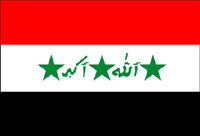Iraq: 7 insurgent groups want truce
The seven lesser groups, most of them believed populated by former members or backers of Saddam Hussein's government, military or security agencies, have said they want a truce, Hassan al-Suneid, a lawmaker and member of the political bureau of Prime Minister Nouri al-Maliki's Dawa Party, told The Associated Press.

The contact by the insurgent organizations, which could not be independently verified, would mark an important potential shift and stand as evidence of a growing divide between Iraqi insurgents and the more brutal and ideological fighters of al-Qaida in Iraq, who are believed to mainly be non-Iraqi Islamic militants.
Al-Maliki was considering a possible meeting with leaders of the groups or contacts through intermediaries, al-Suneid said.
He identified only six of the seven organizations by name, listing them as: al-Ashreen Brigades, the Mohammed Army, Abtal al-Iraq (Heroes of Iraq), the 9th of April Group, al-Fatah Brigades, the Brigades of the General Command of the Armed Forces, the AP reports.
The al-Ashreen Brigades operate primarily in Anbar province, the violent insurgent stronghold in the desert west of Baghdad. The organization claims its operations have only been conducted against U.S. forces. They and other insurgents were said to have protected polling places against attacks by other insurgent groups in Anbar province during December parliamentary voting.
Al-Maliki unveiled his 24-point national reconciliation initiative on Sunday, offering amnesty to insurgents who renounce violence and have not committed terror attacks.
Subscribe to Pravda.Ru Telegram channel, Facebook, RSS!





